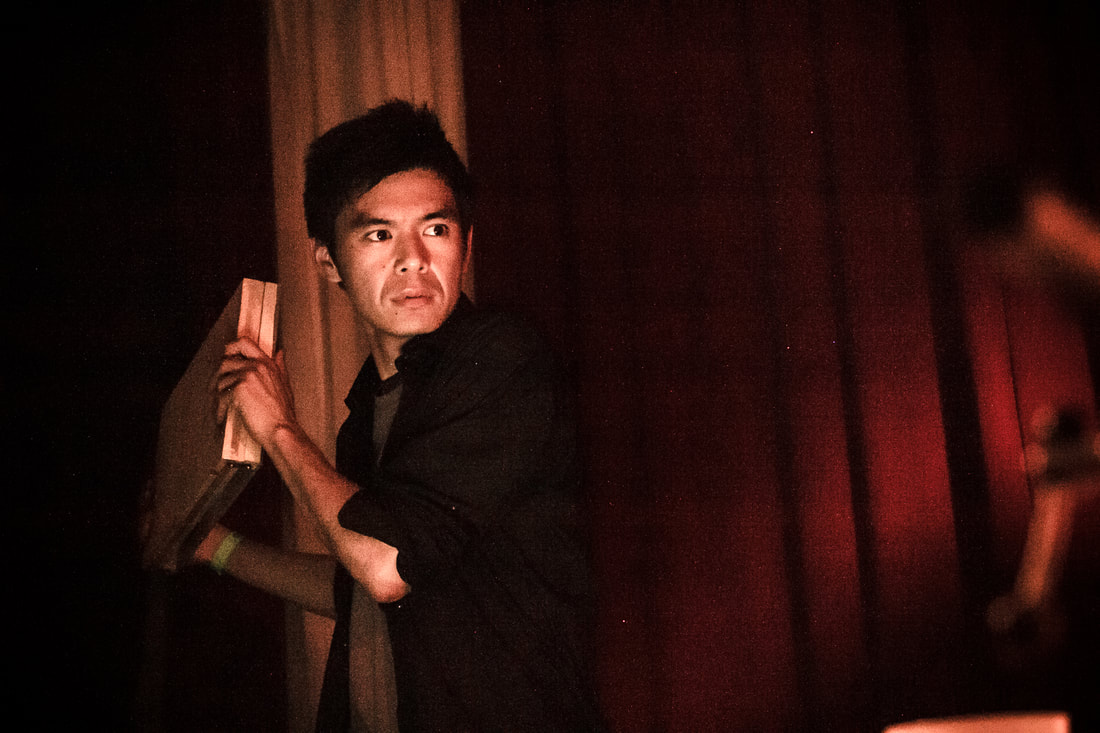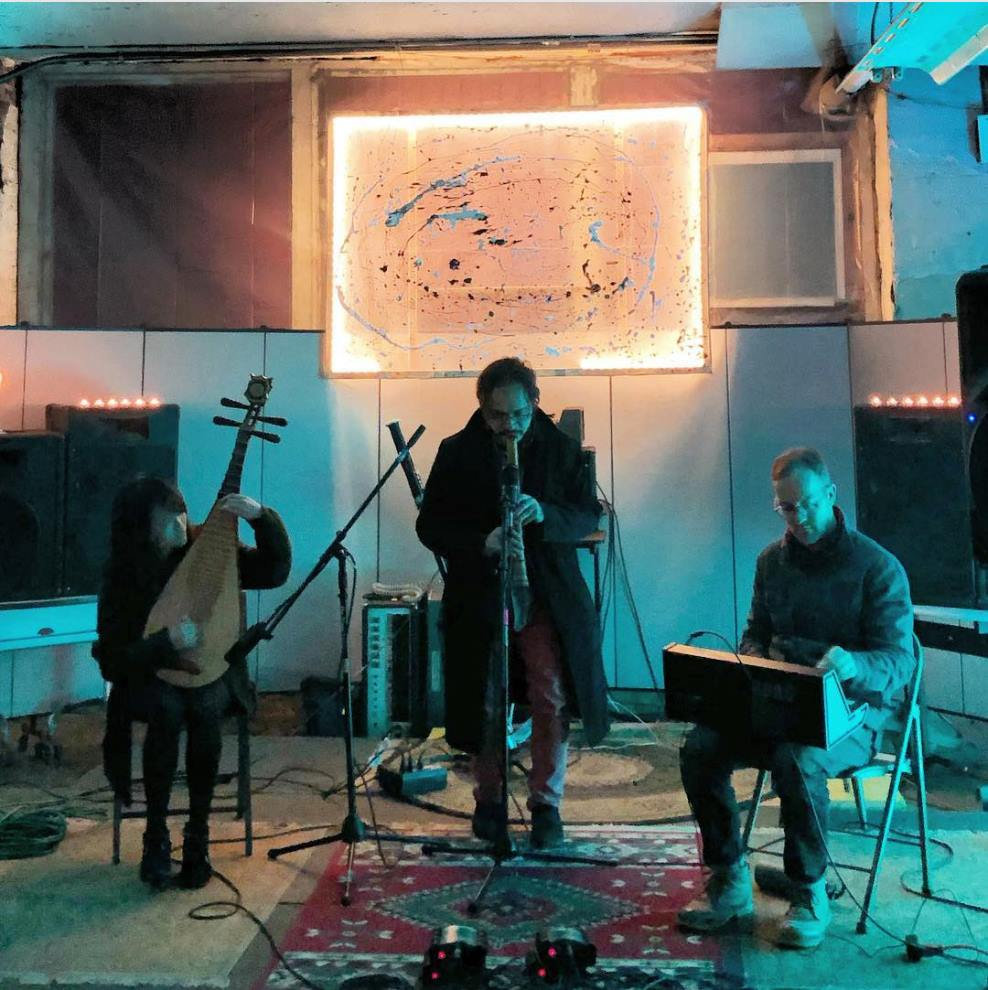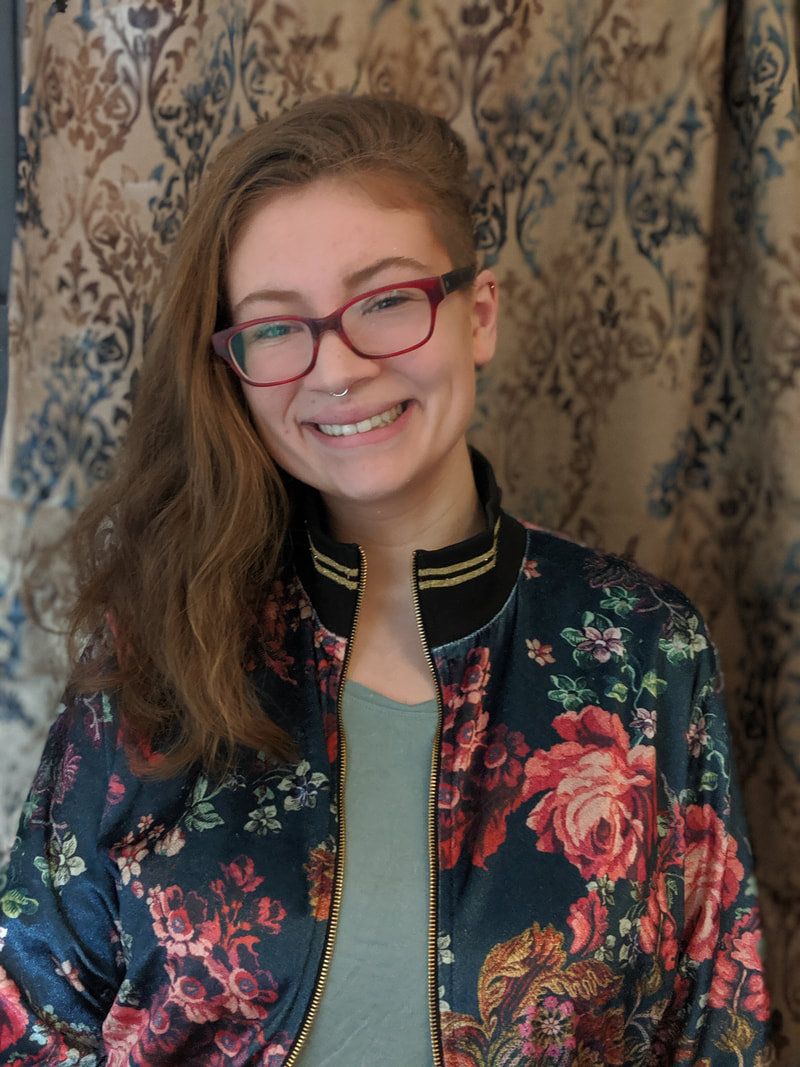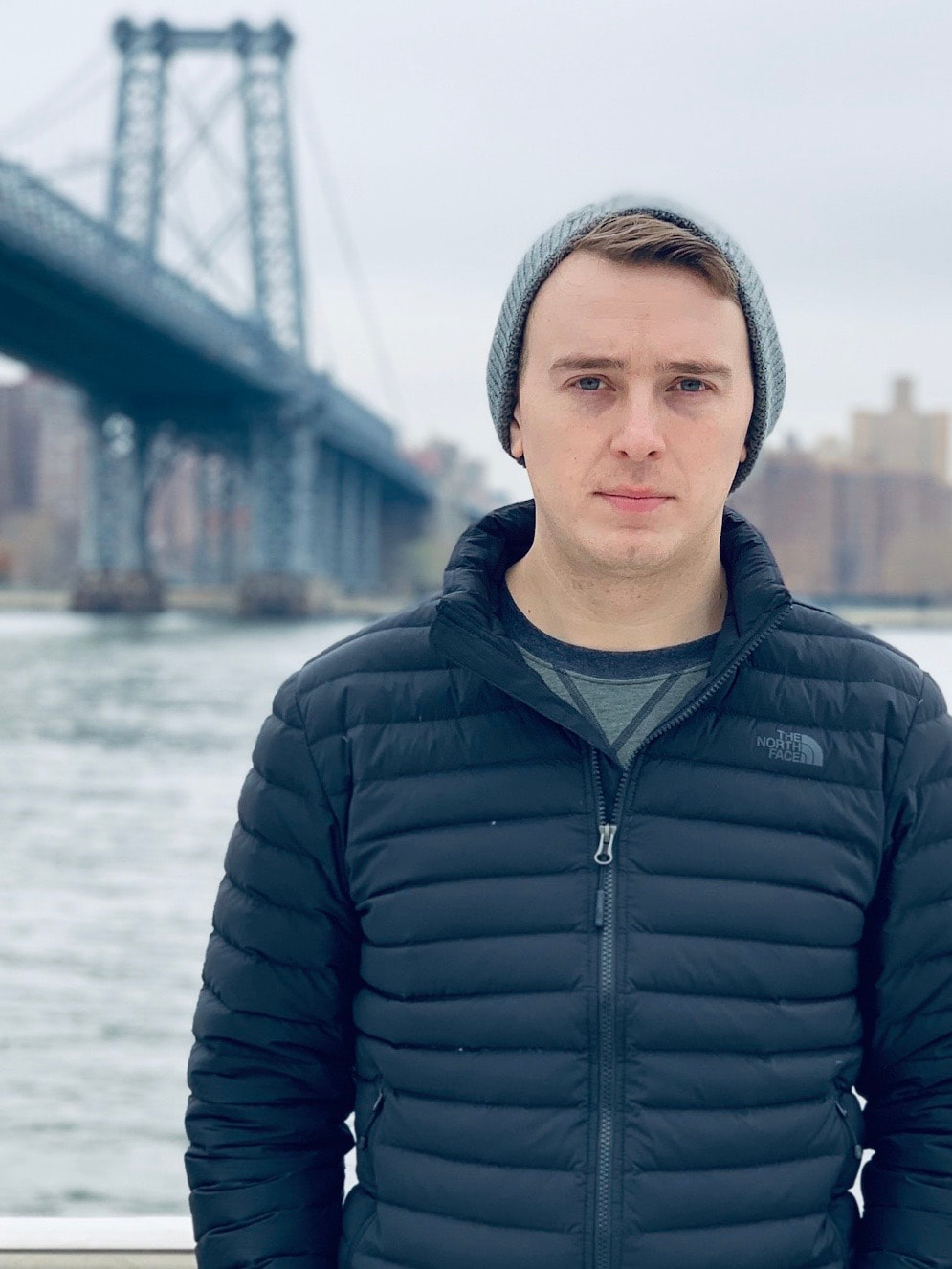|
photo courtesy of Mariya Donska
I first witnessed Takuto Fukuda perform one of his own pieces at the Montreal Conservatory of Music. He and his duo partner, Ana Dall’Ara Majek, took to the stage - Ana behind an augmented theremin and Fukuda grasping a wooden box. Fukuda began shaking the box (which I later found out was connected remotely to a laptop running Max), causing a series of tactile noises to emit from the venue’s PA and with each shake, gyration, and shimmy, new and ever-more inventive sounds popped out of the speakers. The piece not only explored a world of experimental electronic music that doesn’t often rear its head in North America, it employed humor and touches of fun to make the entire choreographed performance extremely fun to watch. “I think humour is a flip side of things taken for granted,” Fukuda said. “Sometimes new technologies open up new possibilities that reveal how naturally my view is prejudiced through my (lack of) experiences, knowledge, imagination about alternatives.” As an active composer-performer in Montreal, Fukuda explores the humorous and fun side of art music that many musicians typically brush aside. This study of the untouched and unknown also drives him to perform many of his own pieces. “There are two reasons why I still continue to perform by myself,” Fukuda said. “First, when I compose a piece for digital musical instruments, there are usually almost no skilled performers, as the performance practice for the instruments are not implemented in educational programs and the instruments are not proliferated enough to foster a pool of players in the world… Second, I find an advantage of self-performance - that is, to run on a rapid feedback among prototyping, performing and composing. Unlike traditional instruments, new digital interfaces are often less expected for a specific manner of performance as their histories do not yet nearly exit. This enables me to explore my own performance modes and even to modify the features of the instrument according to the need for performance and compositions.” Fukuda’s decision to perform and compose stemmed from his upbringing as a computer musician, and ultimately helped him find a new artistic home in Montreal. “[When] I started my [bachelors degree] at the college, I did not have efficient means to produce even sound,” Fukuda said. “Because I started to study music only as late as I was 19 years old, that is so late to master a foundation of music-making, such as solfeggi and playing an acoustic instrument. So, computer was for me the first practical tool to produce sound to me.” “During my [masters degree] in Graz, Austria, my friends, Jonathan Carter and Nick Acorne, suggested to perform as a laptop trio,” Fukuda continued. “After the first year of our experiment with commercial MIDI controllers, Nick Acorne suggested [that we] build our own gestural controllers using sensors… We built three DIY-style DMIs and created [a] number of repertoire with those instruments for self-performances. It had become our norm to perform with those controllers.“ “After I left Graz, and arrived in Montreal in Canada for my doctoral study in 2017, I reunited with a composer-performer, Ana Dall’Ara-Majek. It was the timing that she was wondering to perform more often with her own theremin, while I was looking for a collaborator to perform with my gestural controller. So, we started to create pieces together.” From these collaborations, Fukuda has brought electronic music to life like very few others and has found ways to make what might be run-of-the-mill performances into full-scale spectacles. His next major piece will push the boundary even further. “I am currently working on an audiovisual composition, “Simulacra,” for five cellists and computer,” Takuto said. “In this piece, I address the question: what is it that engenders a sense of ‘authentic’ concert experience in the age of simulation?” “The title refers to Jean Baudrillard's concept of ‘simulacrum’ defined as a copy without original. With this concept, he pointed out that the modern industrial world entered the situation where abstract models, symbols and codes generate numerous mass-produced items, thereby eliminating the concept of the original object existing in the physical world and so negating the concept of authenticity... Using various techniques for spatiotemporal dispositions… I aim to draw listeners attention to the ambiguity of the coupling of cause-effect relationship between performer’s gesture and resultant sounds.” Fukuda’s musical trajectory sets him apart from his peers and his approach to music finds the perfect balance between theory and showmanship that few composers can truly master. His art stands as a fantastic example of finding exciting ways to harness the unheard, while relating back to the everyday listener. “I want music to be a platform for intellectual exchanges among audience members, performers, composers and whoever committed to its production and reception, rather than seeing music as a single directional medium from a composer to the audience,” Fukuda said. “So, it would be great if my contribution will create a space into which other people can insert some commentaries in various forms such as literature, dance and other piece of music. I wish that we will be able to generate and share a plentiful number of ideas, insights, sentiments and dreams.” You can learn more about Fukuda on his website and Soundcloud.
1 Comment
Photo courtesy of Devon Tipp
Brutality has always dwelt underneath the work of Devon Osamu Tipp. The composer-performer’s works, such as “Blood on the Pavement 1984,” and “Music For Cannibals,” evoke a certain harshness that doesn’t often rear its head in the current wave of contemporary classical music. This same aggressive energy serves as a springboard for Tipp, who has propelled himself to new heights through the study of Japanese musical traditions and by emerging as an improviser and performer on the shakuhachi. “As a composer, I guess I'm now like 10-12 years into it,” Tipp said. “I realized there was a certain point where I had stopped performing more or less all together. I felt like there was a disconnect in my music and so I started reaching out to friends of mine.” “What really changed things was when I started studying shakuhachi through playing traditional Japanese music, through getting back to a Stage where I felt I could perform and make it work." Tipp continued. "But when I felt really comfortable wearing those shoes, that's when I started experimenting more with things like improvising, these sort of different kinds of nuances of timbre, transformations of sound, it took a long time and has been a long transitional period.” “I was surprised to realize about a year or two ago how much I actually enjoyed performing, how much I enjoyed being in front of an audience and performing , whether it was ensemble stuff or solo stuff or chamber stuff, it doesn't matter. I really missed that experience of getting out into the field and getting your hands dirty.” This drive recently culminated in a collaboration between Tipp and several composers on his new album, Shadows, Hymns, and Offerings: New Music For The Shakuhachi. The album focuses on works for electronics and Tipp’s solo performance on the Japanese woodwind, which delves into rich textures and harmonic concepts brought to life with extended techniques and bending timbres into otherworldly forms. Tipp’s multitude of experiences as a musician helped him fully realize this project. “I've spent a lot of time in the past few years just thinking about like ‘you have your teaching hat, you have your performing hat, and you have your composer hat,’” Tipp said. “How do these different performative aspects communicate with each other for better or worse?” “Some of the pieces that I written for shakuhachi recently are meant to be performed with extended techniques that may or may not necessarily be thought of in the same way in traditional Japanese music. It's like trying to identify as many different things going on there as possible.” Much of the same philosophy inflects Tipp’s composition in the same way it integrates into his performance practice. “I was really invested in trying to sort of get to the core of - if you will - this idea of verticality of sound,” Tipp said. “…you sort of have your standard Western concert music and this idea of, say like a Mozart symphony or Beethoven symphony and as late as maybe Bartok - it’s very concerned with a linear passage of time. [It] doesn't really exist in the same way in traditional Japanese music.” The vertical way of thinking has shaped a variety of pieces, including one of his most recent creations, “Cheat Sadness, Enjoy Suffering,” which also incorporated influence from the Butoh school of Japanese dance theater. “Up until recently, I was doing a lot of these long and slow pieces,” Tipp said. “It’s one of those things where the concept sounds great, but the execution is very challenging. It came to a point where I realized ‘I think I'll put it aside’ and instead, I started just looking backwards.” “I was doing some academic research on the post-world War II dance phenomenon called Butoh,” Tipp continued. “It’s a very intense form of dance that a lot of people sort of say erroneously is a result of the dropping of the two bombs on Japan, but it's nowhere near as simple as that.” “All the dances have different kinds of notation and they use a… notation where there are images, there is poetry, and various different things telling you how to conduct yourself in a dance. I'm not a dancer and I'm not nearly as aware of the tensions of my body as someone who does this work regularly.The gestures are so subtle, because [the dancers are] thinking ‘if I'm not careful, [everything] will collapse.’” Whether Tipp is re-shaping Western art music or inflecting the current sonic landscape with new timbres from his shakuhachi, more collaborations and projects loom on the horizon. According to Tipp, a guiding principle lies at the heart of his current work. “One of the interesting things that happens is when… you start trying to figure out what it is that you can offer to people, whether it's as a composer, as a performer or just as a human being at trying to making it work.” You can hear more of Devon Osamu Tipp’s music on his website and soundcloud. Listen to his latest release below. photo courtesy of Jonathan Hannau “I really love absurdity and tend to find humor in life and mundane activities,” Jonathan Hannau said. “People who know me know that I look at memes way too much and that I enjoy exploring the internet for the most absurd and nonsensical images.” “Dadaism was big for me in high school… and my sense of humor developed with that as I got older. So I think those two things just intertwined and now I laugh at ridiculous shit. So when I was asked for the first time to compose a piece for 2 performers and harp and given the instructions to make it light and funny, that opportunity opened me up to explore the medium more.” The final product was one of the most fun experiences I have had in a classical music concert when Dal Niente brought the piece with them to Spectrum NYC in early 2018. The crowd expected a very staunch performance, while Hannau’s foreboding title of “Beyond the Looking Glass” and lack of program notes promised a heady, cerebral piece. He transcended all expectations and might be considered one of the first composers to actually put the creative strategies of Andre Breton and Marcel Duchamp to effective use in music. “So at one point I think my thought process is, ‘ok: wire brushes on the strings, what’s next? Oh how about a tooth brush, that’s close to a wire brush… you know you should floss after you brush, how about we put the cloth through the harp now and ‘floss…’ ok, give the other person $5 for the good job they did, ok say ‘Thanks for the Five,’” Hannau said . “So it’s a lot of stream of consciousness and letting my mind wander to what I thought would be silly, senseless humor.” In addition to composing, Hannau keeps one foot in the performance world, both as a solo pianist and as an active ensemble member in Chicago’s Ursa Ensemble, as well as Trade Winds Ensemble, a performance group who fosters young musicians in precarious environments and employs teaching techniques that reject colonialist tendencies. “I’ve been with the group for a few years now and we’ve done workshops here in Chicago, in Haiti, as well as in Detroit at the Ruth Ellis Center with foster LGBTQ youth,” Hannau said. “We focus a lot on constant discussion and critique of our teaching methods and seek ways to really allow a student to express themselves in a very unique and personal way, be it through music, writing, or movement.” “Although we’re all classically trained, our workshops and methods always focus on a few things: Where are our students coming from? What do they need right now from us and with music? We change curricula and strategies to make sure we meet our students where they are at and that they have a positive and inspiring time to continue becoming their best selves. It’s not about becoming the best violinist/pianist/composer: it’s about becoming a leader and member of a larger global community.” Even with his packed schedule, Hannau continues to push forward with new projects, including the release of a new album of his music looming on the horizon. “The album is inspired by my meditation music improvisation series called ‘Music, Stillness, Solidarity,’”Hannau said. “I improvise minimalist piano music - often with other musicians - for an hour and it’s a very therapeutic experience that has helped listeners center themselves and be at peace for a little in their hectic lives.” “My favorite image I’ve gotten from listeners who have heard some of the pieces is how it reminds them of snowfall,” Hannau continued. “I never really had images in mind as I wrote the pieces, but the more I thought about it and talked about it with colleagues, I’ve decided the album will contain a title at least exploring snowfall. Since quarantine started, I’ve gotten the whole album into my computer. The next step is to learn the rest of the pieces! Hopefully I will drop this on a record label soon enough.” “[A] big question I asked myself was ‘how do I make audiences experience the same joy and awe I have in weird sounds?’” Hannau said. “I think that’s how it all started. Now I’m just all over the place musically and I couldn’t be happier existing in this world with a huge variety of sounds, thoughts, and expressions.” You can find Jonathan's music and news on his website, as well as his soundcloud and instagram
photo courtesy of Eygló
“My dad likes to tell people that as soon as my fingers reached the keys on the piano I would press them and that I never seemed to make noise or banged the piano, I would always press the keys gently,” Eygló said. “I obviously don't remember any of those instances but what I do remember is my first inspiration to sit down and write a piece of music. I remember seeing a play when I was about 3 years old, and after seeing that play I wrote I sat down at the piano and wrote this little pentatonic melody that I thought for some reason sounded just like the play I had just seen.” Two decades and a handful of years later, Eygló transformed evolutions of these acoustic worlds into “Lo and Behold,” a swirling orchestral work for The Icelandic Symphony Orchestra that premiered at Reykjavik’s Dark Music Days 2020. “As I have never studied composition in Iceland, and barely had my music performed there, I felt like this was my one chance to prove myself for the Icelandic new music scene,” Eygló said. “What was interesting, in the end is that the teachers I've had and the composers I've interacted with in America have almost all told me that my music sounds Icelandic. But after the premiere of my orchestra piece Icelandic composers told me that my music did not sound Icelandic at all. So I guess my music is located somewhere in the Atlantic Ocean.” Eygló’s path to this opportunity took years to realize and has led her around the world, not only as a composer, but also a vocalist. She notably sang alongside Björk on tour, while also gaining performance credits on the album Biophilia. This collaboration helped push Eygló into her current path. “I think my favorite part of the tour, in general, was when we did a residency in Los Angeles in the summer of 2013,” Eygló said. “Until then, I had been struggling with finishing a BSc degree in Psychology, and as weird as it sounds, given up on music. But in LA something happened within me, where I realized that not only did I want to do music for the rest of my life, I simply had to.” “I decided to apply to Berklee College of music and move from Iceland to pursue music in America,” Eygló continued. “Other amazing things that happened in LA… I played Ping Pong against my favorite comedian, who also happened to be the mayor of Reykjavík at the time, Jón Gnarr. I also went to a pool party at Danny Devito's house in Beverly Hills. When I tell that story I like to add that there was no deep end to the pool. But that is, unfortunately, a lie.” From this point, Eygló etched out a unique musical niche discovering sublimity in gentleness and quiet places. “For me, the best sounds have to be versatile,” Eygló said. “Although some great sounds exist, they too often can only be played at one dynamic and those sounds tend to be on the louder side. I like sounds that are softer, and I like to explore the dynamic range of soft sounds. Lately, I've been very much into ASMR sounds, specifically sounds of slimes.” With the Dark Music Days festival behind her and an accumulated sound world under her belt, Eygló now sets her sights on embarking on new musical exploits. “I'm planning on writing a musical with my friends in Iceland who are playwrights, Eygló said. “The musical will be based on a board game called Danger Game and was originally made to fund the release of EVE online.” The musical isn’t the only musical goal Eygló has in mind. “[In] a party after the performance of my piece with all the members of the Iceland symphony orchestra and other composers… they had hired a DJ to play music,” Eygló said. “I waited until everyone had had a couple of drinks, and started spreading this idea of putting together a cover band called ‘Deceptive Cadence’ that would play at this event the following year and make very weird new music jokes like ‘Next song we'll perform is Theme and Variation on 4'33”’” “My dream project is probably to start that cover band.” You can hear more of Eygló's work on her Soundcloud and her string quartet "silfra" performed by JACK Quartet can be heard below.
photo courtesy of Sam Kaseta
There’s no doubt that Sam Kaseta knows how to make a crowd take notice, whether they stride out on stage as a new music composer, a performing vocalist, their drag king persona Sam Bam Thankyoumaam, or any other of their other countless artistic personas. “I think a lot of it has to do with my musical and performative philosophy, which is that you should always be trying to surprise the audience and keep them guessing what's going to happen next,” Kaseta explains. If you can name a form of live performance, there’s a high chance that Kaseta has experienced it firsthand and blended each style into their own unique musical voice. The end result ends up not only as an intellectually stimulating work of art - it keeps you entertained the whole time through. The highly-relatable themes of Kaseta’s work can entice any audience of any background. Their latest collaborative creation, I Was Unbecoming Then, had been the latest creation in their oeuvre and would have debuted this week, if not for the citywide shutdown of businesses. “The play that I've been working on the music for is a play that was written a few years ago by Lyndsey Bourn… about what it's like to be a girl in high school choir, especially when that choir teacher is very demanding,” Kaseta said. “There is sort of a cult of personality going on, so I wrote a bunch of songs for twelve voices and there's like twelve women in this play who are singing all of the music acapella. Most of these people are actors rather than singers who were made to go through all of these steps of becoming a choral singer… I've honed my conducting and my choral writing, especially for treble voices and now that they've really gotten good at it, we were done.” This show, which hopefully can see the light of day later this year, doesn’t solely define the sonic world that Kaseta inhabits. They have taken their experience of working with actors and found ways to give new autonomy to their performers. “I see it as the performers are like actors,” Kaseta said. “You need someone to realize your work and you need them [to] contribute something of themselves to be able to have it fully fleshed-out, and so I see it as like I am the playwright and I am making up the words that we say.” “Even in the things that are mostly written out… I had lots of aleatoric stuff,” Kaseta continued. “I want the performer to express themselves, and again, it comes back to this thing.. me not wanting to make all the decisions. I do think it is important to give the performer some autonomy. That won’t work for every performer. In that situation, even [with] aleatoric notation, people are still able to do that, and I really, really like that.” Past works, ranging from the historical drag king rock musical Kings to their newest release, “Corrected Thinking” (performed by Cisum Percussion) all took great care in considering the performers, while also pushing the audience into exciting (and sometimes uncomfortable) territory. “It's all about expectations and it's all about misdirection,” Kaseta said. “It's like you're doing a magic trick. So it's something that I've started doing in my pieces, actually, because I have a lot of pieces that are more gestural.” “Pretty much anything I've written for percussion has some involved breaking or smashing something,” Kaseta continued. “If the audience is ahead of us, is waiting for us, is sitting there listening to this music, and not really listening, but instead just waiting for us to break this glass, they're not listening to my music. So we need to be convinced that the piece is about something else, and then when the magic trick finally happened, it’s part of the story rather than something we were sitting there waiting for!” At the end of the day, Kaseta blends storytelling into all of their work and delivers a carefully crafted experience, no matter the style of performance. “I am living in all these different genres,” Kaseta said. “I wish that they were more united… There is no reason why these things need to be that separate because it's really just about writing in different genres. It’s like, what tools are we using? Writing a musical likes a Kings, where it's emphatically a rock musical, there's just a different style of performing that you need as opposed to performing a German art song. But can we put together? I argue yes, and I argue they're not super different. “And I am just making music that I like, but I think it's catchy and it has something important to say,” Kaseta continued. “I like telling stories and like doing it with other people.” Sam's latest release, Corrected Thinking, can be heard below. You can learn more about them and their music on their website.
photo courtesy of J Taylor Arnold
“Long before yMusic was a household name, they toured to my little school,” Taylor Arnold said. “I remember hearing what I know now as ‘Music in Circles’ by Andrew Norman, but then they just called it, ‘a piece our friend wrote us that sounded like his air conditioner on a hot day.’ I never knew music like this existed and instantly knew it was the music I wanted to write.” In that moment, Arnold’s focus crystallized and has since led him down a winding path that has helped him grapple with his past and craft floating dreamscapes for listeners to lose themselves in. This trajectory culminates with a collaboration with the Utah-based classical group, NEXT Ensemble. Arnold received a commission from the group to write an evening-length work for four female voice, piano, cello, and clarinet documents the stories of the wives of Joseph Smith, the founder of the Mormon Church. Having grown up in the heart of Utah surrounded by the faith, no one could be better equipped than Arnold to tackle this subject. “For a long time I hated being associated with Mormonism. Part of me still does, I guess,” Arnold said. “But the more I devote time to studying the real history, the more I am beginning to reclaim the title. It will always be a part of me and it’s my constant reality and will forever be the culture my family and Utah community live and interact with. The LDS church doesn’t get to claim that title for themselves, so little by little I’m reclaiming it for what it means to me.” After completing high school and serving in the Marines, Arnold entered university and rediscovered his love of music that he carried with him since his early teens. “I went to college originally for theater, but found it wasn’t the same and I didn’t fit in,” Arnold said. “Then I tried criminal justice and it didn’t feel right. I then switched to Communications with a focus in Public Relations and Marketing.” “It sounds overly cinematic, but I missed music, Arnold continued. “One Veteran’s Day on campus there was a Veteran symphonic band playing in the Student Union Center. They sounded ok. But I was so moved. Not because they were veterans or the patriotic music, but because it brought so many wonderful memories and feelings that I had playing music. I didn’t want to end up like those playing in this band, not in a bad way, I just knew right then that I would never be happy only being a weekend warrior when it came to music. I needed this in my life.” Arnold began fervently composing and over time, developed his own artistic voice within post-minimalism that wades between lush chord arpeggios and lilting melodies. “[Each] piece has a narrative for me,” Arnold said. “There is a story for each piece. But the stories sometimes don’t make a lot of sense - like dreams. One minute you’re in one scene, and then in the blink of the eye you’re somewhere different. But for some reason, in the dream, it all makes sense.” These dream worlds became grounded in 2018, when Arnold wrote a piece for chorus and percussion ensemble that foreshadowed his commission with NEXT Ensemble. Arnold wrote his first major piece with an explicit narrative incorporating the words of Helen Mar Kimball, the fourteen year old bride of Joseph Smith. The stories of the wives of the Mormon leader became touchstones that have driven Taylor’s latest work. “These stories, in many cases, well-documented stories are very problematic for the Mormon Church as they claim to be the One-true living Church on the Earth today, led by a prophet of God, just as Moses was a prophet,” Arnold said. “There isn’t much room for moral turpitude in it’s leaders since they speak directly with and are the mouthpiece of God. The Mormon Church teaches from a very young age, absolute obedience. I remember singing songs before I was eight years old like, ‘Follow the Prophet, don’t go astray...follow the prophet, he knows the way.’” “The more I read about the young polygamous wives of Joseph Smith the more outraged I became that their stories had been squashed, Arnold continued. “In the midst of studying these women, a massive news story broke in the Mormon World - Joseph Bishop, the former President of the Missionary Training Center (where they send all those young 19 year olds to study for a month to three months before they send them away to knock on your doors) had been recorded admitting to sexually abusing women in the basement of the MTC. It sent shockwaves through the Church - God makes no mistakes in his callings. Yet, somehow, a predator was in one of the highest callings in the Church… This caused me to study more and more and I’m so grateful to have the opportunity to share their stories, although the project is daunting and I feel a huge amount of responsibility to be sincere to them and their worldview while also explaining what happened.” With Arnold’s ever-evolving musical language and his increasingly confrontational works that bring Mormonism to the public consciousness, one driving ethos rings true in his new work. “I really want people to just begin asking questions,” Arnold said. “Just because everyone has done it forever, doesn’t make it right.” Taylor Arnold’s Music can be found on his website and Soundcloud. His work with NEXT Ensemble is slated to premiere in April 2021 |
AuthorErich is a musician and writer living between Montreal and New York whose work appears on Best Life, Eat This, Not That!, MSN, and more and has represented artists for years as a PR rep. He likes weird music. If you want to find his music, it's over here. Archives
August 2020
Categories |






